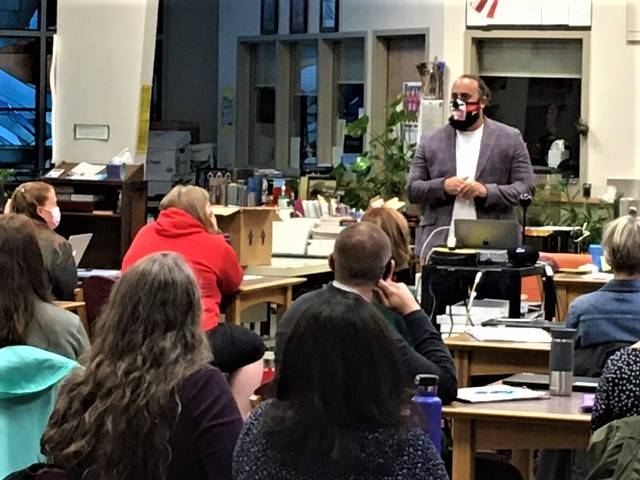As Juneau’s students return to schools this fall, their teachers have a new approach to helping them grow socially and emotionally so that they can grow academically.
Recently, the entire staff attended an in-service presentation about equity and school-based restorative practices facilitated by Dominique Smith, principal at Health Sciences High and Middle College, a charter school in San Diego.
In an interview with the Empire, Smith said he is passionate about creating school cultures that honor students and build their confidence and competence. He said school staff does that by focusing on equity and building relationships.
“Relationships matter and protecting relationships matter. We build the connection so people feel safe,” he said. He explained that staff members can build relationships by reflecting on key questions, such as “what is right for this individual student at this time and in this place?” he said.
According to Ted Wilson, director of teaching and learning support for the Juneau School District, it’s an approach that makes sense — especially now. He said that as students return to school after COVID-19 suspended in-person learning, many students will have additional needs.
“Everything is connected,” Wilson said. “To have academic achievement, students must be ready. That’s why we do social, emotional, and family engagement. Relationships are what matter.”
Frommherz seeks school board seat
Wilson said that the district has talked about the concept for several years and that Smith’s training helps to provide a framework to put the ideas into action.
“When students are faced with a stressor and need a tool, this training helps teachers think about what to say and develop a vocabulary and strategies that help support students,” Wilson said.
Maressa Jensen, a trauma-engaged school specialist for Juneau Public Schools, said that the school staff knows that students and families “have been under tremendous stress,” and some of that stress could spill over into classrooms.
She said when classroom management efforts address the well-being and needs of individuals, results tend to improve.
She offered a comparison to bike riding. She said if every child in a class was issued the same bike with the same settings, only a few students could easily ride the bike. She said that if each child gets a bike that fits their needs, more students can enjoy bike riding sooner.
“We figure out what’s right for the individual on a day-to-day basis,” she said.
Restorative practices
According to Smith, restorative practices are an essential component of school discipline in this model.
“Restorative practices are a technique to look at discipline in a different way,” he said, explaining that when students do make poor choices, it’s critical to look deeper and to help the student take accountability for their actions.
“They should own the mistake and repair the harm as part of the process to re-enter,” he said. “When students take ownership, they go through a process of thinking about how to fix things. It’s much harder than just getting kicked out of class.”
Candidate seeks open school board seat
Building muscles
Smith acknowledged that adopting this mindset may be new for some and can take work. But, he said the staff members he spoke to expressed excitement about the idea.
“With anything new, it’s nerve-racking,” he said. “But then teachers reflect and realize this is something they’ve done their whole life. They realize ‘this is stuff we can do. Stuff we have done and we can get even better at it,’” he said.
Smith said this process augments instruction and boosts learning.
“All students have needs. Through relationships, observations, questions and reflections, we can meet those needs,” he said.
Jensen agreed.
“The ultimate goal is academic achievement. When students feel better about school, we see better achievement,” she said.
• Contact reporter Dana Zigmund at dana.zigmund@juneauempire.com or 907-308-4891.

